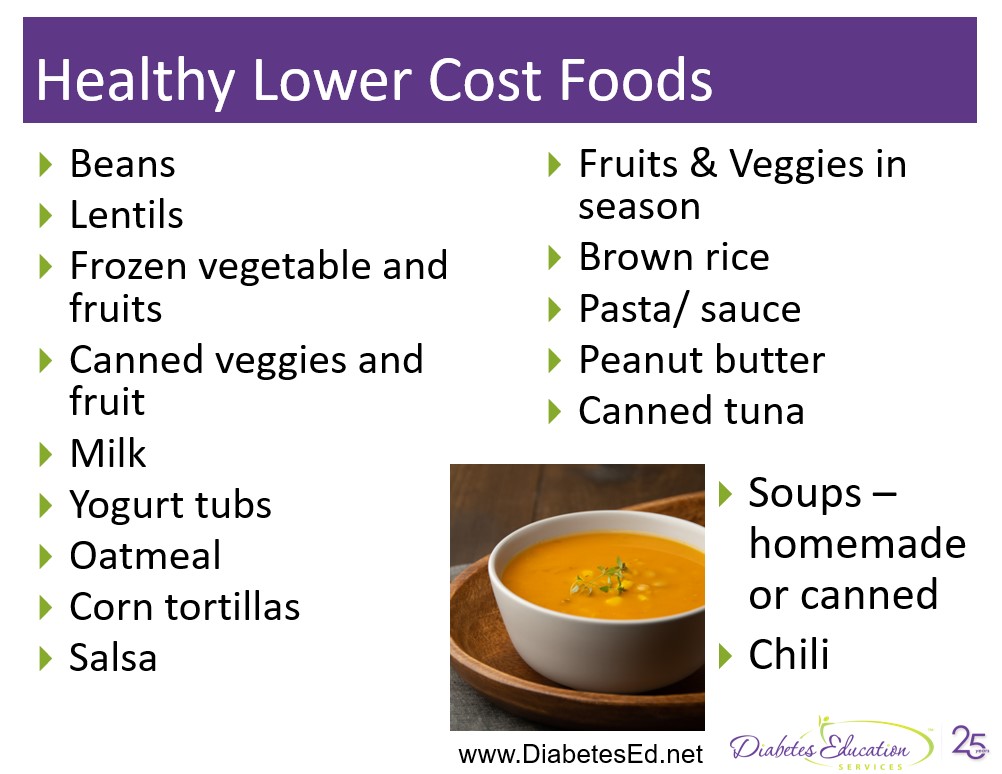Question of the Week | Is Fast Food the best solution for Food Insecurity?
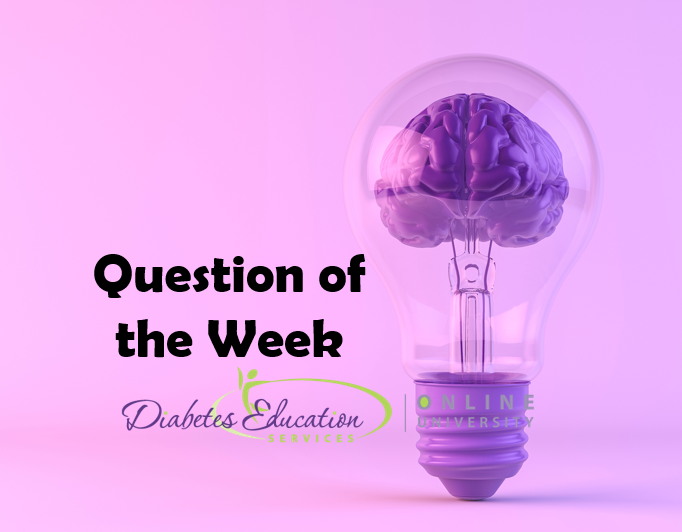
Due to the increased cost of groceries, JR tells you all they can afford to eat are fast foods.
As a diabetes care and education specialist, what is the best response?
- We generally recommend avoiding fast foods due to high fat and carbohydrate content.
- Let’s explore the possibility of preparing lower-cost, healthier foods at home.
- Ask JR to make a list of reasons that fast food may not be the best choice.
- Suggest eating more fresh fruits and vegetables to increase fiber intake.
Click Here to Test your Knowledge
Want to learn more about Medical Nutrition Therapy?
You are invited to join our Virtual Conference with our Nutrition expert speaker, Ashley LaBrier, MS, RD, CDCES, who will be providing a half-day presentation on this important topic!

Ashley LaBrier, MS, RD, CDES, is an innovator in the field of diabetes, nutrition, and technology. Ashley is a consultant and the Diabetes Education Program Coordinator at the Salinas Valley Medical Clinic’s Diabetes & Endocrine Center.
Ms. LaBrier is passionate about providing person-centered education to empower those who live with diabetes. Having been diagnosed with type 1 diabetes herself nearly 20 years ago, she combines her professional knowledge with personal experience and understanding.
Virtual DiabetesEd Training Conference
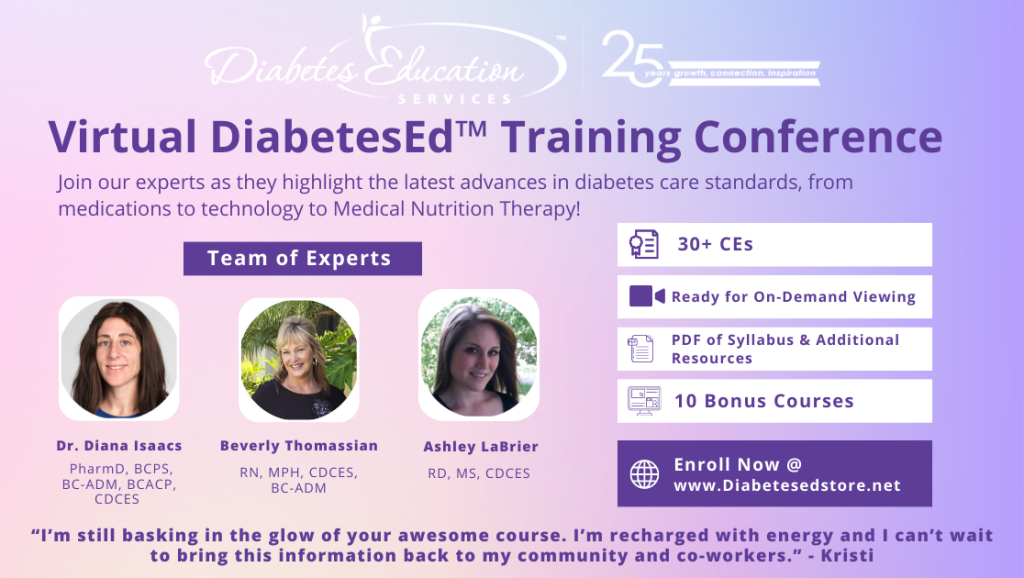
Whether you are new to diabetes or a seasoned expert, you’ll benefit from this virtual conference with the latest research plus critical content that you can immediately apply to your clinical practice.
If you are seeking a state-of-the-art review of current diabetes care, this course is for you. Our team has been fine-tuning this course for over fifteen years, and we know what you need. This program can also be a great addition to your CDCES or BC-ADM exam study plan.
Group discounts are available!*
Download Course Flyer | Download Schedule
All hours earned count toward your CDCES Accreditation Information
Sign up for Diabetes Blog Bytes – we post one daily Blog Byte from Monday to Friday. And of course, Tuesday is our Question of the Week. It’s Informative and FREE! Sign up below!
The use of DES products does not guarantee the successful passage of the CDCES exam. CBDCE does not endorse any preparatory or review materials for the CDCES exam, except for those published by CBDCE.
Rationale of the Week | Prediabetes after GDM-What do the Standards Recommend?

For last week’s practice question, we quizzed participants on prediabetes after GDM. It was a challenging question and 60% of respondents chose the best answer. We want to clarify and share this important information, so you can pass it on to people living with diabetes and your colleagues, plus prepare for exam success!
Before we start though, if you don’t want any spoilers and haven’t tried the question yet, you can answer it below: Answer Question
Question:
LR experienced gestational diabetes with their third pregnancy and now, at age 41, was just diagnosed with prediabetes. LR’s BMI is 29.3 and she is trying to lose weight.
Based on the 2023 ADA Standards of Care, in addition to providing LR with lifestyle coaching, what other intervention is recommended?
Answer Choices:
- Start a GLP-1 RA Inhibitor to support weight loss.
- Initiate metformin therapy.
- Start pioglitazone (Actos) at a low dose
- Suggest adding a SGLT-2i to lower glucose and protect renal function.
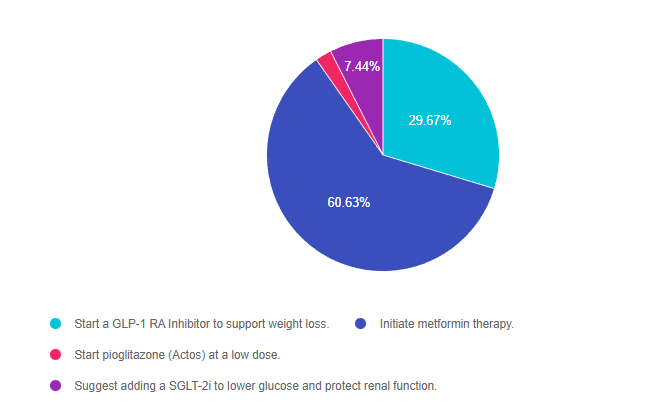
Getting to the Best Answer
Answer 1 is incorrect. 29.67% chose this answer, “Start a GLP-1 RA Inhibitor to support weight loss.” Since LR has prediabetes, not diabetes, and her BMI is less than 30, GLP-1 RA therapy isn’t indicated. Plus, this recommendation isn’t included in the ADA standards (see below).
Answer 2 is correct. 60.63% of you chose this answer, “Initiate metformin therapy.” YES, this is the BEST answer. GREAT JOB! For people with a history of GDM who now express prediabetes, they have a very high risk of getting diabetes in the near future. In addition to referring to a Diabetes Prevention Program, the Standards recommend initiation of metformin therapy to delay the onset of diabetes.
Answer 3 is incorrect. 2.27% of respondents chose this answer, “Start pioglitazone (Actos) at a low dose” Although low dose pioglitazone is recommended for those with prediabetes or diabetes and a history of stroke, LR has no history of stroke. In addition, pioglitazone is associated with weight gain and is not recommended in the ADA Standards to treat prediabetes.
Finally, Answer 4 is incorrect. 7.44% chose this answer, “Suggest adding a SGLT-2i to lower glucose and protect renal function.” Since LR has prediabetes, not diabetes and no signs of kidney problems, SGLT-2i therapy isn’t indicated. Plus, this recommendation isn’t included in the ADA standards (see below).
Thank you so much for reading this “Rationale of the Week”. For more information on this topic, we also invite you to join our Online Courses and Virtual DiabetesEd Training Program.
Strategies to Address Diabetes & Food Insecurity
Lilly Caps Insulin at $35
Today, Lilly announced caps on out-of-pocket insulin costs at $35 per month and price reductions of 70% for its most commonly prescribed insulins.
- Effective immediately, Lilly will automatically cap out-of-pocket costs at $35 at participating retail pharmacies for people with commercial insurance using Lilly insulin.
- People who don’t have insurance can continue to go to InsulinAffordability.com and immediately download the Lilly Insulin Value Program savings card to receive Lilly insulins for $35 per month.
In addition, according to their website announcement, Lilly is reducing the list price of insulins:

- Cutting the list price of its non-branded insulin, Insulin Lispro Injection 100 units/mL, to $25 a vial, effective May 1, 2023.
- Cutting the list price of Humalog® (insulin lispro) 100 units/mL and Humulin® (insulin human) injection 100 units/mL by 70% in the fourth quarter 2023.
- Launching RezvoglarTM (insulin glargine-aglr) injection, a basal insulin that is biosimilar to, and interchangeable with, Lantus® (insulin glargine) injection, for $92 per five pack of KwikPens®
“The aggressive price cuts we’re announcing today should make a real difference for Americans with diabetes. Because these price cuts will take time for the insurance and pharmacy system to implement, we are taking the additional step to immediately cap out-of-pocket costs for patients who use Lilly insulin and are not covered by the recent Medicare Part D cap” said David A. Ricks, Lilly’s Chair and CEO.
American Diabetes Association (ADA) Celebrates
“The American Diabetes Association (ADA) is the leading voice advocating for insulin affordability and is working to ensure that all people with diabetes have access to the care they need. We applaud Eli Lilly for taking the important step to limit cost-sharing for its insulin, and we encourage other insulin manufacturers to do the same. While we have been able to help achieve significant progress on the issue of insulin affordability, including Medicare’s new out-of-pocket cost cap on insulin, state copay caps, and patient assistance developments from insulin manufacturers, we know that our work is not done. We will work to ensure that Eli Lilly’s patient assistance program is benefiting patients as intended and continue the fight so that everyone who needs insulin has access.”? — Charles “Chuck” Henderson, CEO of the American Diabetes Association
Insulin has grown increasingly expensive in recent years despite the introduction of new competition. Many people with diabetes ration their medicines or discontinue them because of the cost. More than 30 million Americans live with diabetes, and more than seven million of them rely on insulin.
Join the ADA’s Fight for Affordable Insulin!
Click here to learn more and get involved!
Medicare Caps Insulin at $35 a month
Read our blog here for more info
FREE Insulin PocketCard with Complete Insulin Listing
Question of the Week | What is Person-Centered Care?

TR is a health care professional who provides diabetes care and education support. They are interested in providing more person-centered care to the individuals they serve.
Which of the following statements verifies they are on the right track?
- Adherence to the diabetes self-care plan takes time.
- Motivating individuals to engage in their self-management is the first step.
- Adult learners do best when provided a step-by-step demonstration.
- Creating mutual agreement on the plan for next steps.
Click Here to Test your Knowledge
Virtual DiabetesEd Training Conference

Whether you are new to diabetes or a seasoned expert, you’ll benefit from this virtual conference with the latest research plus critical content that you can immediately apply to your clinical practice.
If you are seeking a state-of-the-art review of current diabetes care, this course is for you. Our team has been fine-tuning this course for over fifteen years, and we know what you need. This program can also be a great addition to your CDCES or BC-ADM exam study plan.
Group discounts are available!*
Download Course Flyer | Download Schedule
All hours earned count toward your CDCES Accreditation Information
Sign up for Diabetes Blog Bytes – we post one daily Blog Byte from Monday to Friday. And of course, Tuesday is our Question of the Week. It’s Informative and FREE! Sign up below!
The use of DES products does not guarantee the successful passage of the CDCES exam. CBDCE does not endorse any preparatory or review materials for the CDCES exam, except for those published by CBDCE.
Rationale of the Week | Lipid Targets & New ADA Standards

For last week’s practice question, we quizzed participants on the new ADA Standards for lipid management. It was a complicated question and 43% of respondents chose the best answer. We want to clarify and share this important information, so you can pass it on to people living with diabetes and your colleagues, plus prepare for exam success!
Before we start though, if you don’t want any spoilers and haven’t tried the question yet, you can answer it below: Answer Question
Question:
JR is 67 with type 1 diabetes and was discharged a few months ago after receiving a coronary artery bypass. JR is on insulin pump therapy and a CGM, with a recent A1C of 6.7%. Their blood pressure is 129/78.
Other recent labs include:
- LDL cholesterol of 67 mg/dL
- HDL 54 mg/dL
- Triglycerides 172 mg/dL
- UACR 23 mg/g GFR 61
JR’s medications include: insulin, atorvastatin 80mg, atenolol 50mg, and aspirin therapy. JR has met with the dietitian and is trying to eat healthfully. They have lost 5 pounds over the past few months.
Based on the 2023 ADA Standards of Care and JR’s history, which of the following is considered best practice?
Answer Choices:
- Add an ACE or ARB
- Keep LDL cholesterol less than 70 mg/dL
- Increase fiber intake by 20%
- Add ezetimibe (Zetia) or a PCSK9
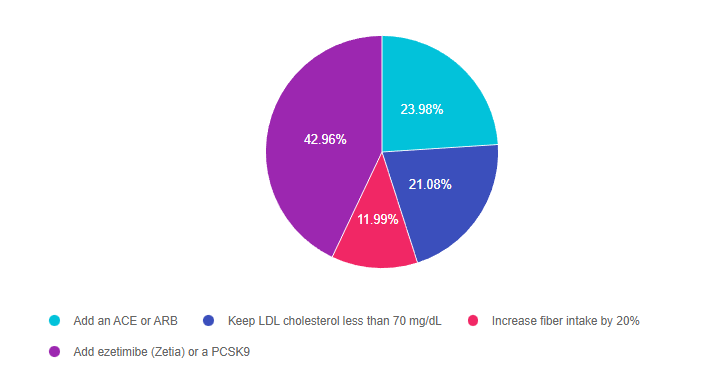
Getting to the Best Answer
Answer 1 is incorrect. 23.93% chose this answer, “Add an ACE or ARB.” This was a juicy answer. However, since the B/P is on target at less than 130/80 and JR does not have an elevated UACR, adding an ACE or ARB is not indicated at this time.
Answer 2 is incorrect. 21.08% of you chose this answer, “Keep LDL cholesterol less than 70 mg/dL.” Since JR has ASCVD, as evidenced by their need for a coronary artery bypass, the LDL target is less than 55 mg/dL. This new intensified LDL target is based on the 2023 updated guidelines. Read our blog on New Lipid Guidelines here.
Answer 3 is incorrect. 11.99% of respondents chose this answer, “Increase fiber intake by 20%.” While increasing fiber intake is always a good idea, in may not be enough to help JR get their LDL to a target level of less than 55 mg/dl.
Finally, Answer 4 is correct. 42.96% chose this answer, “Add ezetimibe (Zetia) or a PCSK9.” Yes, this is the best answer, GREAT JOB. Since JR has ASCVD, as evidenced by their need for a coronary artery bypass, the LDL target is less than 55 mg/dL. Since they are already on max dose of atorvastatin at 80mg, the ADA Guidelines recommend adding an additional agent, either ezetimibe (Zetia) or a PCSK9 to further lower the LDL to reach a target of less than 55 mg/dL. Download Lipid Medication Cheat Sheet Here
Thank you so much for reading this “Rationale of the Week”. For more information on this topic, we encourage you to Read our blog on New Lipid Guidelines and Download Lipid Medication Cheat Sheet Here. We also invite you to join our Online Courses and Virtual DiabetesEd Training Program.
Virtual DiabetesEd Training Conference

Whether you are new to diabetes or a seasoned expert, you’ll benefit from this virtual conference with the latest research plus critical content that you can immediately apply to your clinical practice.
If you are seeking a state-of-the-art review of current diabetes care, this course is for you. Our team has been fine-tuning this course for over fifteen years, and we know what you need. This program can also be a great addition to your CDCES or BC-ADM exam study plan.
Group discounts are available!*
Download Course Flyer | Download Schedule
All hours earned count toward your CDCES Accreditation Information
Sign up for Diabetes Blog Bytes – we post one daily Blog Byte from Monday to Friday. And of course, Tuesday is our Question of the Week. It’s Informative and FREE! Sign up below!
The use of DES products does not guarantee the successful passage of the CDCES exam. CBDCE does not endorse any preparatory or review materials for the CDCES exam, except for those published by CBDCE.
New Type 1 Diabetes Treatment Approved – More Expansive Screening Needed?
With the approval of Tzield (teplizumab-mzwv), an anti-CD3 monoclonal antibody, we can now offer children 8 years and older an opportunity to delay the progression to type 1 diabetes for up to two years or longer and improve beta cell function.
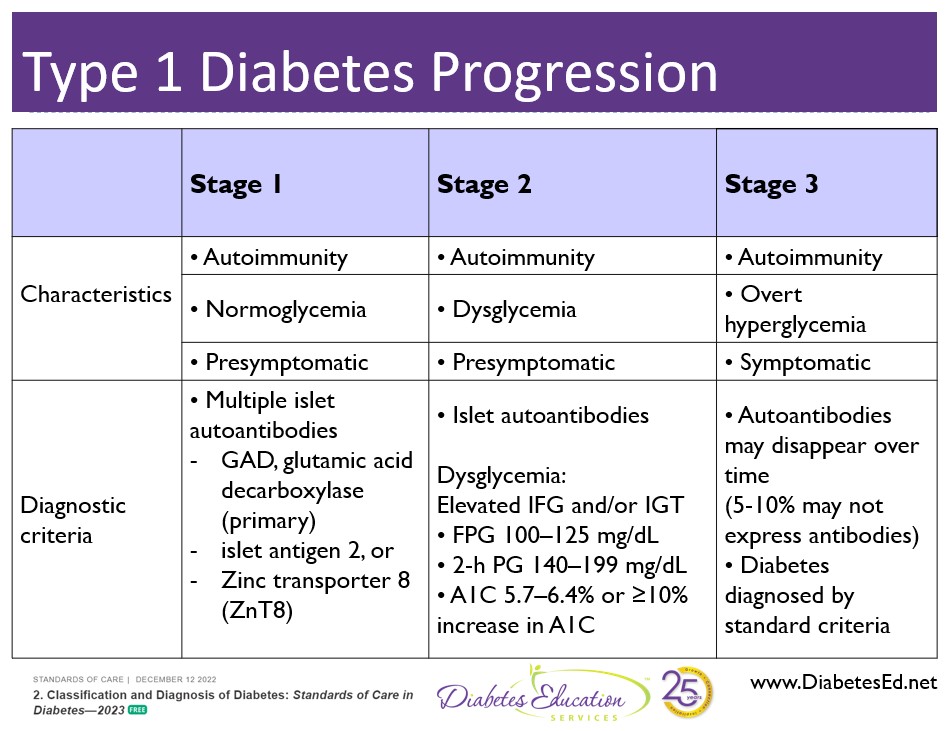
Teplizumab is the first disease-modifying therapy that impedes the progression of type 1 diabetes by binding to the surface of T cells to dampen the unwanted immune system response. It can delay the onset of symptomatic stage 3 type 1 diabetes in adults and children 8 years and older with stage 2 type 1 diabetes (see staging chart).
It is administered by intravenous infusion once daily for 14 consecutive days and is expected to cost in the region of $200,000 for the course of treatment.
Teplizumab is indicated for the individual in stage 2 type 1 diabetes, or for those with two or more islet autoantibodies and abnormal glycemia but still asymptomatic. People with stage 2 type 1 diabetes, have a nearly 100% lifetime risk of progression to clinical (stage 3) type 1 diabetes and a 75% risk of developing the condition within 5 years.
Results from a landmark clinical type 1 prevention trial conducted by TrialNet showed that with a two-week course of teplizumab:
- 72% of people in the control group developed clinical diabetes, compared to only 43% of the teplizumab group.
- The median time for people in the control group to develop clinical diabetes (stage 3) was just over 24 months, while those in the treatment group had an average of 48 months before progressing to clinical diabetes (stage 3).
Insulin production in response to glucose was impaired in the participants before they enrolled in the trial. In participants given an inactive placebo, insulin production declined through the first six months of the study. But in those treated with teplizumab, insulin production improved after treatment.
These results suggest that a single course of Teplizumab may provide long-lasting improvement in beta cell function. This, in turn, could delay or even prevent the development of type 1 diabetes in high-risk individuals.
More Screening for Type 1 Needed?
The ability to halt the progression of stage 2 type 1 diabetes from progressing to symptomatic stage 3 diabetes brings the prospect of more wide spread screening for type 1 into sharper focus. Currently, 40-50% of new type 1 diabetes is diagnosed when the individual is admitted to the hospital in a life-threatening hyperglycemic crisis or DKA. Studies suggest, identifying children at risk of future type 1 could avert DKA presentation, saving hundreds of thousands of dollars in hospital costs and allowing for early CD3 monoclonal antibody intervention.
Based on data from Trialnet, even though type 1 diabetes runs in families, 85 – 90% of people don’t have a first-degree relative with type 1 diabetes. That means, broader screening initiatives will be needed to identify those at risk for type 1 and eligible for the benefits of Teplizumab therapy.
Universal genetic or antibody screening in the future?
The Juvenile Diabetes Research Foundation is working toward a two-pronged screening approach.
This includes testing infants at birth with a genetic risk score combined with antibody screening. With this approach, providers can monitor kids with high genetic risk scores – based on human leukocyte antigen haplotypes, and provide education to family members regarding signs of hyperglycemia. In addition, antibody screening can help identify the stage of autoimmunity and help guide treatment action.
Researchers now have solid proof that immunotherapy can slow the progression of type 1 diabetes. This offers hope to conduct additional studies to extend the benefits of teplizumab, while continuing to test other immune therapies. Keep posted!
Virtual DiabetesEd Training Conference

Whether you are new to diabetes or a seasoned expert, you’ll benefit from this virtual conference with the latest research plus critical content that you can immediately apply to your clinical practice.
If you are seeking a state-of-the-art review of current diabetes care, this course is for you. Our team has been fine-tuning this course for over fifteen years, and we know what you need. This program can also be a great addition to your CDCES or BC-ADM exam study plan.
Group discounts are available!*
Download Course Flyer | Download Schedule
All hours earned count toward your CDCES Accreditation Information
Sign up for Diabetes Blog Bytes – we post one daily Blog Byte from Monday to Friday. And of course, Tuesday is our Question of the Week. It’s Informative and FREE! Sign up below!
The use of DES products does not guarantee the successful passage of the CDCES exam. CBDCE does not endorse any preparatory or review materials for the CDCES exam, except for those published by CBDCE.
Question of the Week | Prediabetes after GDM-What do the Standards Recommend?

LR experienced gestational diabetes with their third pregnancy and now, at age 41, was just diagnosed with prediabetes. LR’s BMI is 29.3 and she is trying to lose weight.
Based on the 2023 ADA Standards of Care, in addition to providing LR with lifestyle coaching, what other intervention is recommended?
- Start a GLP-1 RA Inhibitor to support weight loss.
- Initiate metformin therapy.
- Start pioglitazone (Actos) at a low dose
- Suggest adding a SGLT-2i to lower glucose and protect renal function.
Click Here to Test your Knowledge
Virtual DiabetesEd Training Conference

Whether you are new to diabetes or a seasoned expert, you’ll benefit from this virtual conference with the latest research plus critical content that you can immediately apply to your clinical practice.
If you are seeking a state-of-the-art review of current diabetes care, this course is for you. Our team has been fine-tuning this course for over fifteen years, and we know what you need. This program can also be a great addition to your CDCES or BC-ADM exam study plan.
Group discounts are available!*
Download Course Flyer | Download Schedule
All hours earned count toward your CDCES Accreditation Information
Sign up for Diabetes Blog Bytes – we post one daily Blog Byte from Monday to Friday. And of course, Tuesday is our Question of the Week. It’s Informative and FREE! Sign up below!
The use of DES products does not guarantee the successful passage of the CDCES exam. CBDCE does not endorse any preparatory or review materials for the CDCES exam, except for those published by CBDCE.



